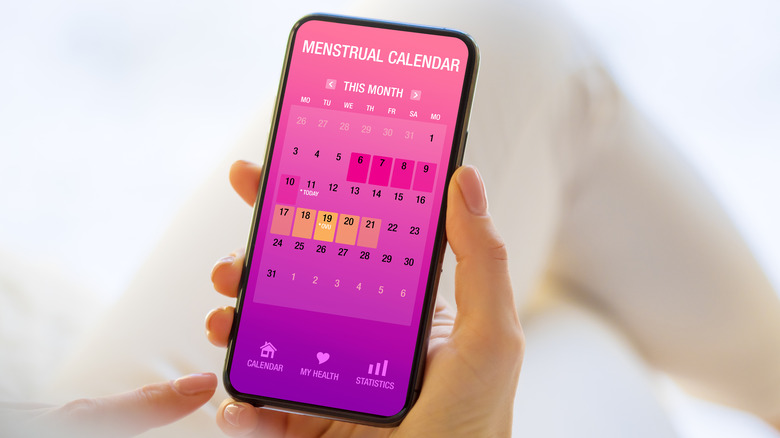How Your Period Actually Changes Your Brain
When it comes to a woman's period, Cleveland Clinic says those uncomfortable 3 to 5 days (though 2 to 7 is still considered normal) make up only up to a week of your full menstrual cycle, which ranges an average of 28 days and consists of 4 phases. The first day of your period kicks off phase 1, the menstrual (or menses) phase, by shedding the lining of your uterus through your vagina. Phase 2, the follicular phase, starts on day 6. During this time, estrogen begins to rise as the lining of your uterus starts to thicken and follicles begin to grow. Between days 10 and 14, one of the follicles will develop an egg. Ovulation is phase 3, and it happens around day 14. When you ovulate, the follicle releases the egg.
Phase 4, the luteal phase, is from days 15 to 28. In this final phase, the egg travels through the fallopian tubes to the uterus. If you get pregnant, the egg attaches to the wall of your uterus. If you don't get pregnant, the menstrual cycle repeats. According to VeryWellFamily, sperm can live in your body for about 3 days. That means even though ovulation doesn't happen until day 14, you can get pregnant between days 11 and 16.
Obviously, a lot is happening in your body — and just as much is happening in your brain.
Fluctuating hormones make it hard to function
Your hormones are consistently rising and falling during your menstrual cycle, namely estrogen and progesterone, according to MindBodyGreen. As a result, your brain may not always perform at its best. Understanding what's going on inside your body can help you properly address different symptoms that are associated with your cycle.
Brain fog is common during your period. If you have a hard time concentrating or find yourself being more absent minded than usual, give yourself some grace. To combat brain fog, Healthline recommends taking a break from your phone, eating antioxidant-rich foods (like blueberries, nuts, beets, and fish), and drinking less caffeine and alcohol. Headaches can also be common and typically result from low iron, stress, and dehydration. Unusually heavy periods can be a sign of iron deficiency. MindBodyGreen says to eat more foods like red meat, salmon, beans, or tofu, and talk to your doctor about taking a supplement. Also be sure to drink about 90 ounces of water a day and try minimize activities that stress you out.
From around day 15 to the last day of your menstrual cycle, (your period is day 1), the decrease in oxygen might cause you to have memory lapses. When this happens, Mayo Clinic says getting organized, playing mental games like crosswords puzzles, and sleeping well can help. During this time, you may also experience clumsiness. Health advises slowing down, be patient, and working on one task at a time.


